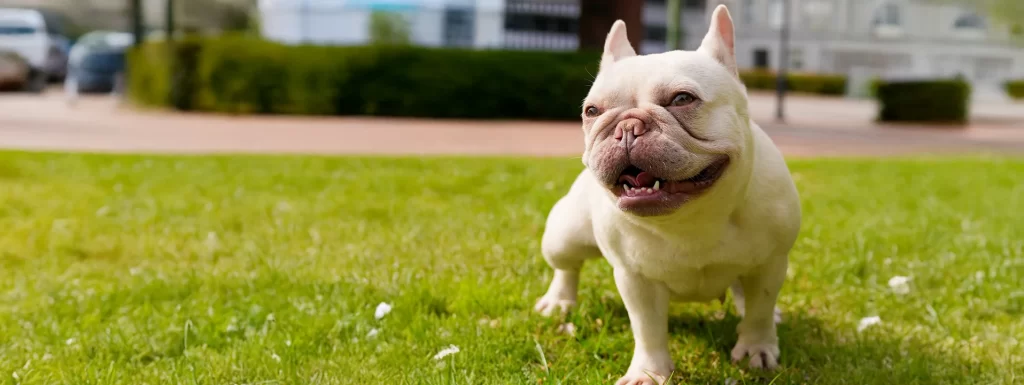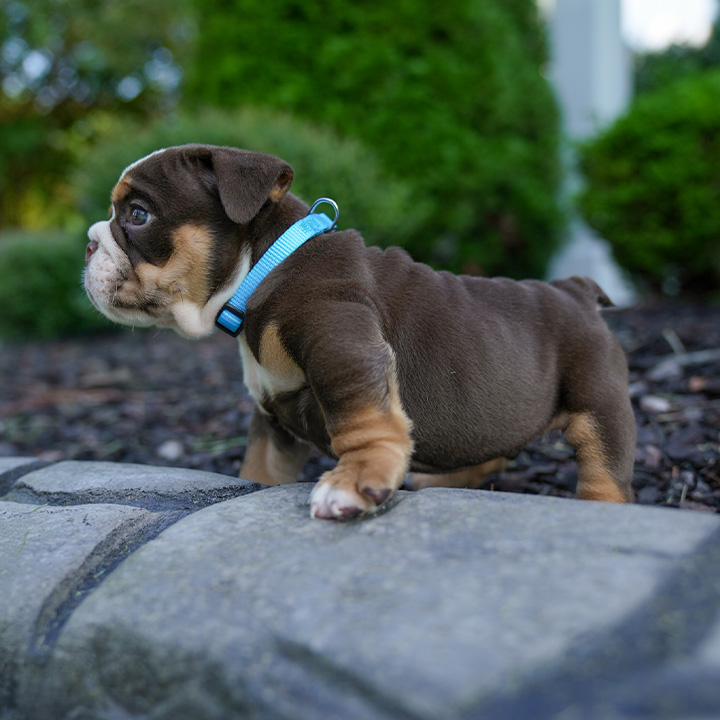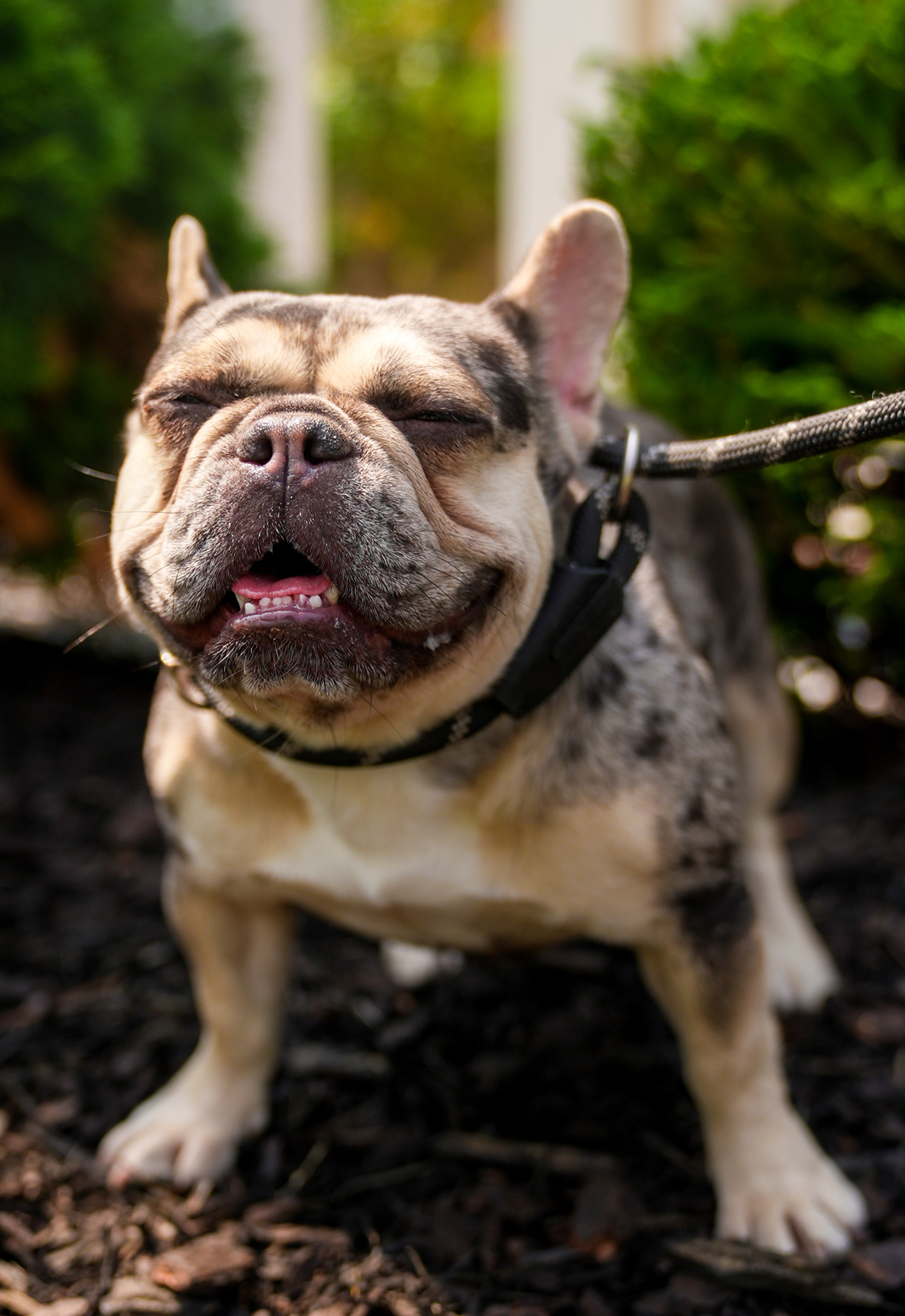French Bulldogs don’t obey to impress you.
They obey when they feel like it.
They’re not difficult because they’re dumb. They’re difficult because they’re opinionated.
If you want a dog that follows commands without question, look elsewhere. If you want a dog with personality, humor, and a bit of rebellion—read on.
This guide cuts through the noise and shows you how to handle real French Bulldog training problems.

Why French Bulldog Training Is Different
French Bulldogs are emotional. They read your tone, your face, and your energy. What they don’t do is blindly follow orders.
They’re smart. But not the way a Border Collie is smart. Frenchies respond to mood, not structure.
Their physical structure also creates challenges. They’re a brachycephalic breed—meaning they have flat faces and narrow airways. That means they tire faster, overheat quickly, and struggle with extended walks or high-energy sessions.
If your training feels like a battle, it’s not you. It’s the breed.
You just need the right approach.
Problem #1: Housebreaking Troubles
French Bulldogs are notoriously slow to housebreak. It’s not because they can’t learn—it’s because they don’t care about your carpet the way you do.
If left unsupervised, they’ll go wherever feels convenient.
Fix:
- Use crate training. Dogs don’t like to soil where they sleep.
- Set a feeding and potty schedule and stick to it.
- Take them out first thing in the morning, after meals, and every few hours.
- Don’t use puppy pads long-term. It confuses them about what’s “indoors.”
- Praise and reward every success. Don’t punish mistakes—clean them silently.
Be ready for a 4–6 month process. This isn’t a weekend fix.
Problem #2: Refusing to Listen
French Bulldogs often pretend they didn’t hear you. They did. They’re just deciding whether or not to respond.
This drives new owners crazy.
Fix:
End every session on a win.
Start with an easy command they already know. Then mix in one new cue. Reward them for every success. If they fail, don’t escalate. Stay calm. Go back to what they know and end with that.
Frenchies don’t respond to dominance. They respond to consistency.
Problem #3: Leash Pulling or Refusing to Walk
Some Frenchies will drag you down the block. Others will freeze up and not move. Both are common—and both have physical and emotional causes.
Their flat faces make breathing hard. Some don’t walk well in heat. Others are simply overwhelmed by the outside world.
Fix:
- Start indoors if they’re nervous.
- Use a harness, not a collar. Collars can hurt their airways.
- Keep walks short—10 to 15 minutes at a time.
- Use treats to reward forward motion.
- Don’t pull or drag. Let them get comfortable in their own time.
You’re not just training a dog—you’re building trust.
Problem #4: Jumping on Guests
Frenchies love people. That’s part of the problem.
They jump out of excitement, not aggression.
The more attention they get for jumping—positive or negative—the more they’ll do it.
Fix:
- Ignore the jump. No eye contact. No “no.”
- Only greet them when all four paws are on the floor.
- Teach a “sit” at the door.
- Ask guests to do the same—consistency matters.
- Reward calm behavior immediately.
Frenchies don’t understand “don’t”—they understand what gets rewarded.
Problem #5: Barking or Whining for Attention
French Bulldogs aren’t barkers. But they do make noise.
They grunt, whine, whimper, and sometimes sing—especially when they want attention or feel anxious.
This often starts small. But if rewarded, it gets louder over time.
Fix:
- Wait for silence before giving attention.
- Reward quiet behavior.
- Use puzzle toys and frozen treats to keep them busy.
- Rotate toys to keep novelty high.
- Avoid coddling whining—it teaches them noise = reward.
Let them earn your attention with calm, not chaos.
Problem #6: Chewing on Furniture or Crate
Frenchie puppies chew because of teething. Adults chew from boredom or anxiety. It’s not out of spite—it’s survival behavior.
Crates and furniture are common targets if they’re left alone too long.
Fix:
- Swap what they shouldn’t chew with what they can.
- Use frozen carrots, Kong toys, or bully sticks.
- Crate train properly—never use it as punishment.
- Keep crate time positive. Add blankets, toys, and rewards.
- If chewing is anxiety-based, increase play and connection—not just confinement.
The crate should be a retreat—not a jail.
Problem #7: Separation Anxiety
This is the big one. French Bulldogs bond deeply. Leaving them alone—even for a short time—can cause distress.
They whine, bark, pace, or destroy things. Not because they’re bad, but because they feel abandoned.
Fix:
- Train short separations. Leave for 1–2 minutes, then return. Gradually increase.
- Don’t make a big deal when leaving or returning.
- Leave a worn shirt in the crate—it smells like you.
- Use calming chews or music, if needed.
- Give them a job while you’re gone (like a frozen treat puzzle).
- Reward calm behavior. Ignore dramatics.
An anxious dog doesn’t need more excitement—they need structure and calm energy.
FAQs: French Bulldog Training
How hard are French Bulldogs to train?
They’re harder than most breeds, but not impossible. It’s not about dominance or alpha energy—it’s about structure and timing. Frenchies don’t respond to yelling. They need training that’s consistent, short, and rewarding. If you miss the window, they’ll shut down or wander off. The key is to make training feel like a game, not a chore. If it’s fun, they’ll play along.
Are French Bulldogs smart dogs?
Yes, but not in the “obedience trial” way. They’re emotionally intelligent—able to read your tone, facial expressions, and energy. They remember patterns and routines. They’re not driven to work or perform, though. You won’t see many Frenchies on agility courses, but they’ll know when you’re upset—and how to guilt you with their eyes.
Can you train a French Bulldog not to bark?
Yes, and it’s usually easier than with yappier breeds. Frenchies bark less but may whine, grunt, or howl if bored or anxious. You don’t stop the sound—you redirect the energy. Give them a “quiet” command, reward silence, and meet their physical and emotional needs. If they’re barking from boredom, give them a job: toys, frozen treats, or short training bursts.
How long does it take to housebreak a French Bulldog?
Plan for 4 to 6 months—sometimes longer in apartments. They’re sensitive to cold, heat, and rain, all of which can throw off progress. Crate training is your best tool, along with feeding on a schedule and always going out at the same times. Never scold indoor accidents. Just clean up and try again. Repetition is everything.
What is the best age to start training a French Bulldog?
Start at 8 weeks. Earlier if you can. The longer you wait, the more stubborn they become. Early training should focus on name recognition, crate familiarity, potty routines, and basic commands like “sit” and “come.” Waiting until 6 months or later makes everything harder.
Do French Bulldogs respond to crate training?
Yes—and many actually love it. Crates make them feel safe when introduced properly. But it has to be gradual. Never use it as punishment or isolate them for too long. Pair crate time with calm praise, treats, and soft blankets. Over time, it becomes their safe place—not a prison.
Is professional training worth it for French Bulldogs?
Yes, especially for first-time owners or anyone struggling with consistency. But it’s not a fix-all. Trainers teach your dog a framework. You still have to reinforce it daily. Without follow-through, even the best trainer won’t get results. A few sessions can go a long way—but only if you stay committed.
Final Thoughts
French Bulldogs won’t change for you. You have to meet them where they are.
They’re loving. Loyal. Ridiculously funny. But they’re also stubborn, emotional, and sensitive.
If you train them right, you’ll get a dog who stays close, learns fast, and sticks by your side for life.
If you try to dominate them or rush them, you’ll only get resistance.
At Bullrite, we don’t just breed healthy French Bulldogs—we raise them with structure and care so they’re ready for life in your home. We support every owner through every challenge.
→ Got questions about French Bulldog training or looking for a well-raised pup? Contact Bullrite today
📚 Sources:
- VCA Hospitals – Brachycephalic Syndrome in Dogs
- AKC – Crate Training Basics
- ASPCA – Dog Behavior and Enrichment
- PetMD – French Bulldog Training and Care


